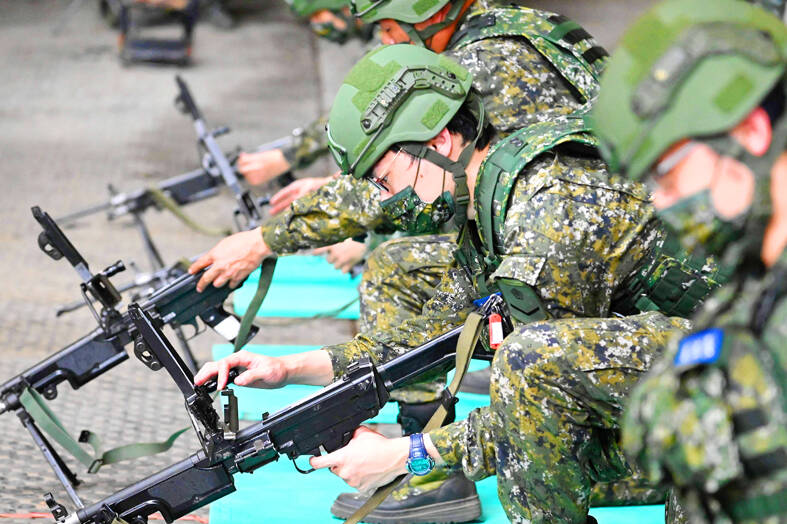Taiwanese armed forces must adapt their training and concepts to modern warfare, a military preparedness advocate said yesterday after a government report revealed that most reservists do not receive refresher training.
The All-Out Defense Mobilization Agency’s refresher training program has trained less than 35 percent of eligible reservists since its establishment in 2020, the Legislative Yuan’s Budget Center said in a recent report.
The Ministry of National Defense said the agency’s target is to establish five new training brigades and three reservist training centers to increase training capacity to 29,000 troops.

Photo: Sam Yeh, AFP
Asked for comment, Kuma Academy co-founder and chief executive officer Ho Cheng-hui (何澄輝) yesterday said that rapidly updating doctrine and techniques is crucial to maintaining military effectiveness amid constant technological change.
Traditional reservist training programs, which emphasize mobilization speed at the expense of giving troops training time, facilities and resources, have been rendered obsolete by sophisticated weapon systems and tactics, he said.
The culture in the nation’s armed forces sees little need to retrain reservists beyond physical training and basic marksmanship, but modern infantry standards have evolved to operating anti-tank guided missiles and other complex weapons systems, he said.
The nation’s basic and reservist training programs have not yet recognized the importance of effectively managing the flow of tactical information and conducting synchronized maneuvers across organizational lines, Ho said.
The military’s training program has neglected military education beyond urging troops to be mindful of the need for secrecy, which does not meet the demands of the modern informational environment, he said.
Traditional spying awareness education about guarding military secrets is insufficient when military secrets could be easily leaked by unguarded use of devices such as phones and smartwatches, he added.
A new basis for cultivating the nation’s will to resist the enemy and consciousness of the enemy is also needed due to changes in Taiwanese society and politics, he said.
The military’s avoidance of transitional justice reforms have contributed to the continued reliance on ideals and modes of thought that are unsuited for its modern role of being the guardians of democracy, he said.
The military curriculum from 10 years ago is at risk of becoming utterly irrelevant today, he said.

SHIPS, TRAINS AND AUTOMOBILES: The ministry has announced changes to varied transportation industries taking effect soon, with a number of effects for passengers Beginning next month, the post office is canceling signature upon delivery and written inquiry services for international registered small packets in accordance with the new policy of the Universal Postal Union, the Ministry of Transportation and Communications said yesterday. The new policy does not apply to packets that are to be delivered to China, the ministry said. Senders of international registered small packets would receive a NT$10 rebate on postage if the packets are sent from Jan. 1 to March 31, it added. The ministry said that three other policies are also scheduled to take effect next month. International cruise ship operators

HORROR STORIES: One victim recounted not realizing they had been stabbed and seeing people bleeding, while another recalled breaking down in tears after fleeing A man on Friday died after he tried to fight the knife-wielding suspect who went on a stabbing spree near two of Taipei’s busiest metro stations, Taipei Mayor Chiang Wan-an (蔣萬安) said. The 57-year-old man, identified by his family name, Yu (余), encountered the suspect at Exit M7 of Taipei Main Station and immediately tried to stop him, but was fatally wounded and later died, Chiang said, calling the incident “heartbreaking.” Yu’s family would receive at least NT$5 million (US$158,584) in compensation through the Taipei Rapid Transit Corp’s (TRTC) insurance coverage, he said after convening an emergency security response meeting yesterday morning. National

PLANNED: The suspect visited the crime scene before the killings, seeking information on how to access the roof, and had extensively researched a 2014 stabbing incident The suspect in a stabbing attack that killed three people and injured 11 in Taipei on Friday had planned the assault and set fires at other locations earlier in the day, law enforcement officials said yesterday. National Police Agency (NPA) Director-General Chang Jung-hsin (張榮興) said the suspect, a 27-year-old man named Chang Wen (張文), began the attacks at 3:40pm, first setting off smoke bombs on a road, damaging cars and motorbikes. Earlier, Chang Wen set fire to a rental room where he was staying on Gongyuan Road in Zhongzheng District (中正), Chang Jung-hsin said. The suspect later threw smoke grenades near two exits

The Forestry and Nature Conservation Agency yesterday launched a gift box to market honey “certified by a Formosan black bear” in appreciation of a beekeeper’s amicable interaction with a honey-thieving bear. Beekeeper Chih Ming-chen (池明鎮) in January inspected his bee farm in Hualien County’s Jhuosi Township (卓溪) and found that more than 20 beehives had been destroyed and many hives were eaten, with bear droppings and paw prints near the destroyed hives, the agency said. Chih returned to the farm to move the remaining beehives away that evening when he encountered a Formosan black bear only 20m away, the agency said. The bear